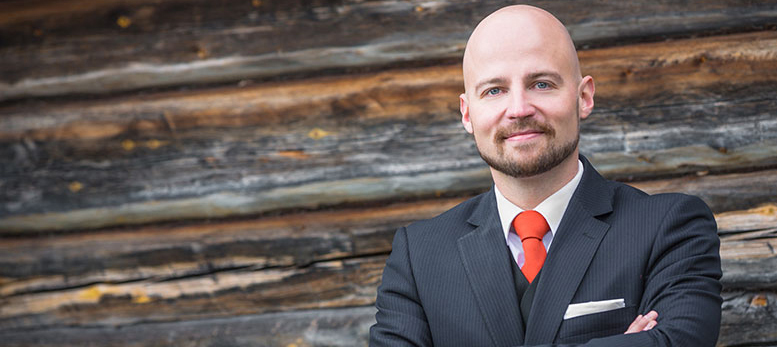15.11.2017 - 15:36
|
Actualització: 13.07.2018 - 07:46
Mikko Kärnä (1980) is a Finnish MP and a member of Findland’s governing Centre Party. As an MP, Kärnä has filed several motions on Catalonia in Finland’s parliament and aims to promote a debate on the subject in the Finnish chamber. He uses his Twitter account to explain the Catalan case to the world and has posted on his blog a number of texts in Catalan which explain the declaration of independence. He has also endorsed motions in other Nordic countries to explore whether they might take on the role of mediators. He says that all his actions are a show of respect for the liberties that Europe has achieved. In an telephone interview with VilaWeb, Mikko Kärnä explains his personal position and how the case is seen in his country.
—What’s going on in Catalonia, from your point of view?
—Everyone is waiting for the polls on December 21, now. And I see that the separatists have stated that they will respect the result. But I am concerned about Spain’s reaction. And I believe that most media are asking PM Rajoy the wrong questions. The pertinent question is: what will he do, if secessionists win the election? Will he respect the election results? Will he respect the fact that the Catalan Republic is taking hold? Or will he add another measure of Article 155 [of the Spanish Constitution] to the equation? And for how long? Until he gets the result that he wants?
—Did you expect such a violent reaction by the Spanish State?
—I had been following the Catalan case for a month, since before October 1. And I was already concerned. I expected the EU and the European countries to take a stand and to do so before the referendum. I was expecting them to say that violence would be unacceptable. But the sheer brutality … that did take me by surprise. It was truly awful. It was organised violence. And an attack on the central values and political liberties that are at the heart of the EU.
—Why are you monitoring Catalonia so closely? Have you got Catalan friends, do you know Barcelona? How come?
—In fact, I’ve never been to Barcelona. I do have a couple of Catalan friends. But, the way I see it, this is a key issue for the EU. I believe in the European Union. I believe in its values, in human rights, democracy and the principle of subsidiarity that we have created. That’s why the EU’s silence makes me so sad and I am so proud of my country, which had the courage to condemn the violence that took place on the day of the referendum. That made me happy. I repeat: to me this is not a Spanish internal affair. It is an internal affair of the EU. If it had happened in Turkey, for instance, we would have rushed to condemn it.
—Why do you say it is a European affair?
—The people who claim that this is a Spanish affair and the EU should not get involved are saying so because they don’t want any trouble for nation-states. I believe in Europe. A Europe that conceives different kinds of areas. A Europe where decisions are made close to the citizens. The closer, the better. You will understand why, if that is my point of view, I believe that the Catalan issue is of paramount importance to the EU. What are we, a federal union or a union of independent nation-states? I am very concerned about the growing tension that we might see ahead of the elections on December 21. We must ensure that it is a fair election and Spain respects its outcome.
—What scares you about Spain’s reaction?
—I’m not afraid of the Catalan people and their government. I’ve always seen that Catalans are willing to negotiate and hold talks with Spain. Always. In contrast, as far as I know, the Guardia Civil and Spanish police are still quartered in Catalonia. I believe that we will see a free election, indeed, and people will vote freely. But what will happen next? What will happen, if the separatist parties win? Are we still going to be stuck in the same rut? There is no way out, unless Catalans and Spaniards engage in talks. The key issue is to have them negotiating at the same table. So far Spain has been very inflexible and they claim they have nothing to discuss, as far as Catalan independence is concerned.
—So, will we see the government of Finland in a mediating capacity?
—We have a great deal of experience as mediators. Many of the most successful international mediators are Finnish. So, it’s a possibility. In my view, the first step should be this: to start an active, open negotiation process between Spain and Catalonia. But, you see, if Spain says it does not wish to negotiate, then it will be very difficult for us to mediate in anything at all. But if both sides asked us to, then I think we would be willing to help. I believe so.
—You are an MP for the Centre Party, a liberal group. It is the ruling party in Finland. Do you expect your party or your government to take any measures?
—I’d like to make it clear that my opinions are only mine. I do not speak for my government. I speak as an MP. And I know that many other parties support me, also in parliament. Traditionally in Finland we have approached foreign affairs not as judges, but as doctors. We wish to help, not judge. And we are willing to help, provided both parts want us to. To mediate. To negotiate. What happened on the day of your referendum what entirely unacceptable. And I am very concerned about what might happen on December 21. I fully understand the Catalan government’s eventual decision to declare but not enact independence, due to threats of force or violence.
—Half the Catalan government is in jail. What should the EU do?
—It’s a complex matter. According to the Spanish government, they have broken the law. That is clear. But in my opinion it means that we have political prisoners in Europe. It’s an embarrassment. Fortunately I am very happy to see that many Nobel prize winners, including former Finnish president Martti Ahtisaari, have condemned this. And they demand that Spain releases the Catalan political prisoners so that they may take part in the December elections freely.
—What should the Catalan government do, if the separatists win the elections?
—It is difficult for me to answer that question. Let me say that I would show my respect for the decisions of a freely-elected Catalan government. I do not have all the facts to say what needs to be done. Still, as an external observer, I would say that if secessionists win the elections, that will mean that the Republic is taking hold. It will mean that the people believe in independence and the Catalan Republic. And then Spain will have to negotiate.
—Now I’d like to ask you about the reaction not only of Finland’s political leaders, but also newspapers and the general public.
—It’s not just politicians who are concerned about the Catalan issue. People and media are also talking about it. I am very proud of Finland’s press, because they have been monitoring the case very closely. And if you follow me on Twitter, you will have seen that I post many cartoons from the main newspapers in Finland which, like many ordinary people, sympathise with the Catalan case. The press have been doing a good job. Of course, not every journalist supports independence and some believe it will never happen. That’s their opinion. Some believe the opposite is true.
—Yours is a centre party. Do parties on the right and the left also have an opinion on Catalonia?
—I was discussing the issue with my colleagues and we thought it was funny. You will find support for the Catalan cause in my party, on the right, the left, the far right and in the green party. It’s not a partisan issue. It goes beyond that. As you must know, this year marks Finland’s centennial. In December. I have tried to point this out: when we voted on independence in our parliament one hundred years ago, there were two hundred MPs. Half of them supported independence. One hundred. That’s 50 per cent. We see that there are 135 seats in your parliament and I believe 70 MPs voted for independence. In other words, support for independence is greater in Catalonia’s case.
—My, my. And what happened in Finland after the vote?
—Our independence was not peaceful. We declared independence and Russia, in fact the Soviet Union, agreed to it. But right afterwards a bloody civil war broke out. Whites against reds. The latter wanted to remain part of the Soviet Union. History shows that the whites won and Finland achieved independence through a civil war. Very bad stuff. Finns agains Finns. The whites were aided by the German empire whereas the Soviet Union helped the reds.
—With no army and no agreement. That’s how Catalans wish to achieve independence.
—It should be possible. It is 2017. If there is one thing that mankind has understood it is that nothing is to be gained from a civil war, especially in Europe. We must be able to negotiate. Obviously, if one day Catalonia becomes independent and the Republic is recognised by the other countries, you will need to meet the necessary requirements. That means controlling your borders and being able to defend yourselves. But that job is to be completed later on. Not now. At the moment the top priority is to debate. The EU, Spain and Catalonia should decide how they will keep moving forward, what is to be done.
—If the EU won’t mediate, I doubt if Spain will sit at any table…
—Well, that’s exactly what our former president and Nobel prize winner Martti Ahtisaari said: the EU must take a stand on the Catalan issue. And mediate. Another former president, Tarja Halonen, also said that she could not understand what the EU was doing, that the EU should be able to negotiate.
—You filed a motion in your parliament. What came out of that?
—The motion has been tabled. It is in progress. It has two parts. The first one argues that Finland should promote political freedom in the EU, as well as a negotiated solution for Spain and Catalonia. The second part states that once Catalonia can show that it meets the necessary requirements to be an independent country, the government of Finland should be prepared to approach the president and recognise Catalonia’s independence. But, like everyone else, you will understand that the Finnish government cannot recognise an independence that has not been enacted yet. Now your political leaders are in jail and the Spanish government has invoked Article 155. I am collecting signatures and we’ve yet to see whether the motion will make it to the Foreign Affairs committee or not. I’m also considering filing a motion to hold a parliamentary debate on the EU and Catalonia.



